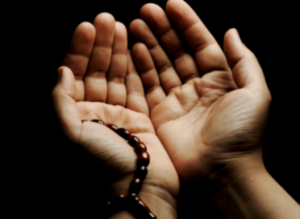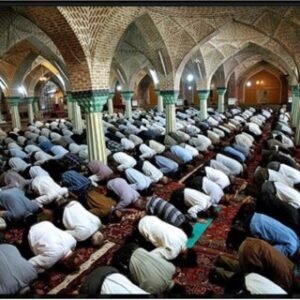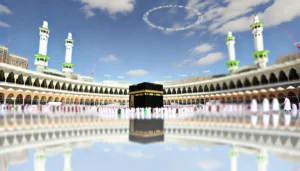The Five Pillars of Islam represent the core beliefs and practices that every Muslim is expected to follow. These pillars form the foundation of a Muslim’s faith and practice, serving as a guide to living a life in accordance with Islamic principles. This comprehensive guide explores each of the Five Pillars, providing Quranic and Hadith evidences in Arabic and translation, along with visual aids to enhance understanding.
1. Shahada (Faith)
The Shahada is the Islamic declaration of faith, expressing the belief in the oneness of Allah and the prophethood of Muhammad (PBUH).
Quranic Evidence:
“شَهِدَ اللَّهُ أَنَّهُ لَا إِلَٰهَ إِلَّا هُوَ وَالْمَلَائِكَةُ وَأُولُو الْعِلْمِ قَائِمًا بِالْقِسْطِ ۚ لَا إِلَٰهَ إِلَّا هُوَ الْعَزِيزُ الْحَكِيمُ”
“Allah witnesses that there is no deity except Him, and [so do] the angels and those of knowledge – [that He is] maintaining [creation] in justice. There is no deity except Him, the Exalted in Might, the Wise.”
(Quran 3:18)
Hadith Evidence:
“قَالَ رَسُولُ اللَّهِ ﷺ: مَنْ قَالَ: لَا إِلَهَ إِلَّا اللَّهُ وَحْدَهُ لَا شَرِيكَ لَهُ لَهُ الْمُلْكُ وَلَهُ الْحَمْدُ وَهُوَ عَلَى كُلِّ شَيْءٍ قَدِيرٌ”
“The Messenger of Allah (ﷺ) said: ‘Whoever says: There is no god but Allah alone, without any partner, to Him belongs the dominion and to Him belongs all praise, and He is over all things Competent.'”
2. Salah (Prayer)
Salah is the practice of performing ritual prayers in the proper way five times each day.
Quranic Evidence:
“وَأَقِيمُوا الصَّلَاةَ وَآتُوا الزَّكَاةَ وَارْكَعُوا مَعَ الرَّاكِعِينَ”
“And establish prayer and give zakah and bow with those who bow [in worship and obedience].”
(Quran 2:43)
Hadith Evidence:
“قَالَ رَسُولُ اللَّهِ ﷺ: الصَّلَاةُ عِمَادُ الدِّينِ”
“The Messenger of Allah (ﷺ) said: ‘Prayer is the pillar of religion.'”
3. Zakat (Charity)
Zakat is the practice of charitable giving based on accumulated wealth and is obligatory for all Muslims who can afford it.
Quranic Evidence:
“وَآتُوا حَقَّهُ يَوْمَ حَصَادِهِ ۖ وَلَا تُسْرِفُوا ۟ إِنَّهُ لَا يُحِبُّ الْمُسْرِفِينَ”
“And give its due [zakah] on the day of its harvest, and be not excessive. Indeed, He does not like those who commit excess.”
(Quran 6:141)
Hadith Evidence:
“قَالَ رَسُولُ اللَّهِ ﷺ: بُنِيَ الإِسْلَامُ عَلَى خَمْسٍ: شَهَادَةِ أَنْ لاَ إِلَهَ إِلاَّ اللَّهُ وَأَنَّ مُحَمَّدًا رَسُولُ اللَّهِ، وَإِقَامِ الصَلاَةِ، وَإِيتَاءِ الزَّكَاةِ، وَصَوْمِ رَمَضَانَ، وَحَجِّ الْبَيْتِ”
“The Messenger of Allah (ﷺ) said: ‘Islam is built upon five [pillars]: bearing witness that there is no god but Allah and that Muhammad is the Messenger of Allah, establishing prayer, paying zakah, fasting in Ramadan, and performing Hajj to the House (the Ka’bah).'”
4. Sawm (Fasting)
Sawm is the practice of fasting during the month of Ramadan, abstaining from food, drink, and other physical needs during the daylight hours.
Quranic Evidence:
“يَا أَيُّهَا الَّذِينَ آمَنُوا كُتِبَ عَلَيْكُمُ الصِّيَامُ كَمَا كُتِبَ عَلَى الَّذِينَ مِن قَبْلِكُمْ لَعَلَّكُمْ تَتَّقُونَ”
“O you who have believed, decreed upon you is fasting as it was decreed upon those before you that you may become righteous.”
(Quran 2:183)
Hadith Evidence:
“قَالَ رَسُولُ اللَّهِ ﷺ: مَنْ صَامَ رَمَضَانَ إِيمَانًا وَاحْتِسَابًا غُفِرَ لَهُ مَا تَقَدَّمَ مِنْ ذَنْبِهِ”
“The Messenger of Allah (ﷺ) said: ‘Whoever fasts during Ramadan out of faith and in the hope of reward, his previous sins will be forgiven.'”
5. Hajj (Pilgrimage)
Hajj is the pilgrimage to Mecca that every Muslim must undertake at least once in their lifetime if they are physically and financially able.
Quranic Evidence:
“وَأَذِّنْ فِي النَّاسِ بِالْحَجِّ يَأْتُوكَ رِجَالًا وَعَلَىٰ كُلِّ ضَامِرٍ يَأْتِينَ مِن كُلِّ فَجٍّ عَمِيقٍ”
“And proclaim to the people the Hajj [pilgrimage]; they will come to you on foot and on every lean camel; they will come from every distant pass.”
(Quran 22:27)
Hadith Evidence:
“قَالَ رَسُولُ اللَّهِ ﷺ: مَنْ حَجَّ فَلَمْ يَرْفُثْ وَلَمْ يَفْسُقْ رَجَعَ كَيَوْمِ وَلَدَتْهُ أُمُّهُ”
“The Messenger of Allah (ﷺ) said: ‘Whoever performs Hajj and does not commit any obscenity or wrongdoing, he will come back (free of sin) as on the day his mother bore him.'”
Conclusion
The Five Pillars of Islam provide a comprehensive framework for a Muslim’s life, encompassing faith, worship, charity, fasting, and pilgrimage. Understanding and practicing these pillars not only strengthens one’s faith but also fosters a sense of community, compassion, and discipline. By adhering to these core principles, Muslims can lead lives that are spiritually fulfilling and socially responsible.








